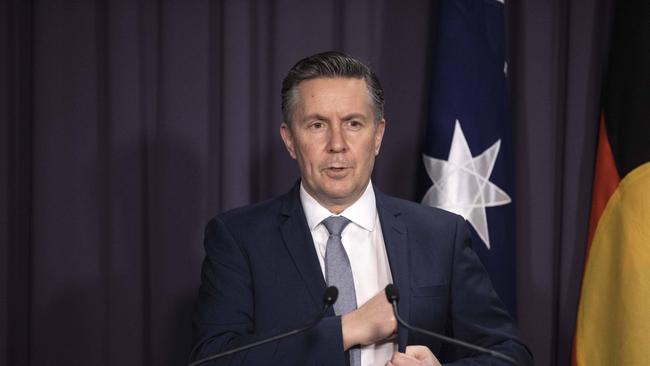Bupa, Ramsay fight puts pressure on customers and Health Minister Mark Butler
Everyday Australians are facing the consequences of Ramsay and Bupa’s stalemate, which is about to become political.

Mark Butler finds himself in an uncomfortable position after Australia’s biggest private hospital operator Ramsay terminated its contract with Bupa, leaving customers of the health insurance major facing potentially hundreds of dollars in out-of-pocket costs.
In coming months the Health Minister will determine how much health insurance premiums will rise by next year.
The health insurance lobby warns that if Bupa capitulates to Ramsay – which is understood to be seeking a funding increase that splits the difference of a 7 per cent rise in hospital costs – Australians will face double digit premium increases.
Such a scenario would create a rude shock to many Australians after most health funds freezed premium rises during the pandemic.
It would also spark an acceleration of the return of the pre-pandemic trend of Australians, mostly young and healthy, withdrawing from private health insurance given the expense and lack of perceived value. That’s not to say that Ramsay should agree to Bupa’s funding increase offer, which is understood to be around 1.5 per cent, although there is some dispute about this figure.
In hospital negotiations, smart health fund executives know they have to navigate an indexation rate that will help keep premium rises low, but not too low that it erodes value.
Why would an Australian family spend almost $2000 a quarter – not to mention high gap fees – on health insurance if Ramsay cannot provide a superior customer experience to the public system? As the cost of living soars, health insurance could become a cuttable luxury.

Bupa’s concern is it has never been easier to switch health insurers. Ramsay has agreements with all other funds, although its contracts with ASX-listed majors Medibank and NIB are up for renewal in the next 12 months.
But Ramsay, known as a tough negotiator, cannot afford to repeat its failed Bupa negotiations with other funds and rely on customer churn, otherwise it faces a funding hole totalling hundreds of millions of dollars.
Inflation has crept into healthcare. NSW public nurses are fighting for a 7 per cent pay rise from the state government after rejecting a 2.53 per cent offer, with the private sector watching the negotiations closely.
Bupa – which operates more than 50 aged care homes across Australia, caring for some 6000 elderly residents – is about to feel the pressure that Ramsay is under.
The Albanese government has vowed to “put nurses back into nursing homes”, backing a “real pay rise” for aged care workers.
This is a mammoth challenge. Australia needs another 85,000 nurses by 2025, according to the commonwealth. It’s a crisis expected to worsen, as hospital operators and aged care providers compete for staff.
Access to nurses is critical for Ramsay. Staff shortages limit its ability to complete a backlog of procedures. Elective surgery bans and Covid-19 costs have so far wiped off $196.2m of the group’s earnings.
From a patient perspective, if you are in a Ramsay hospital – having paid hundreds of dollars extra in out-of-pocket costs because of the company’s stalemate with Bupa – and pressing your hand endlessly on a buzzer waiting for a nurse to provide care, it makes little sense to invest in private health.
Of course, the onus is on hospital providers to also find savings, productivity gains and other efficiencies, rather than be handed a blank cheque.
The reality is, as the Health Minister knows, taxpayers cannot foot Australia’s health bill – already 10.2 per cent of GDP and rising – alone.
Therefore, Ramsay and Bupa must do better, find middle ground and stop using consumers as a bargaining chip.




To join the conversation, please log in. Don't have an account? Register
Join the conversation, you are commenting as Logout